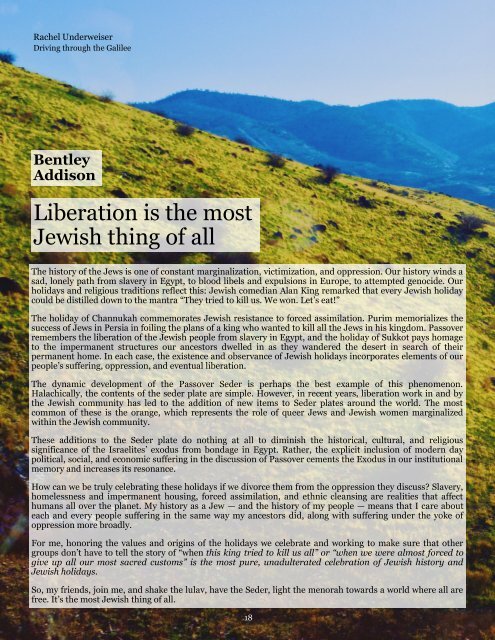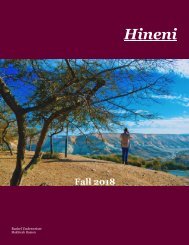Create successful ePaper yourself
Turn your PDF publications into a flip-book with our unique Google optimized e-Paper software.
Rachel Underweiser<br />
Driving through the Galilee<br />
Bentley<br />
Addison<br />
Liberation is the most<br />
Jewish thing of all<br />
The history of the Jews is one of constant marginalization, victimization, and oppression. Our history winds a<br />
sad, lonely path from slavery in Egypt, to blood libels and expulsions in Europe, to attempted genocide. Our<br />
holidays and religious traditions reflect this: Jewish comedian Alan King remarked that every Jewish holiday<br />
could be distilled down to the mantra “They tried to kill us. We won. Let’s eat!”<br />
The holiday of Channukah commemorates Jewish resistance to forced assimilation. Purim memorializes the<br />
success of Jews in Persia in foiling the plans of a king who wanted to kill all the Jews in his kingdom. Passover<br />
remembers the liberation of the Jewish people from slavery in Egypt, and the holiday of Sukkot pays homage<br />
to the impermanent structures our ancestors dwelled in as they wandered the desert in search of their<br />
permanent home. In each case, the existence and observance of Jewish holidays incorporates elements of our<br />
people’s suffering, oppression, and eventual liberation.<br />
The dynamic development of the Passover Seder is perhaps the best example of this phenomenon.<br />
Halachically, the contents of the seder plate are simple. However, in recent years, liberation work in and by<br />
the Jewish community has led to the addition of new items to Seder plates around the world. The most<br />
common of these is the orange, which represents the role of queer Jews and Jewish women marginalized<br />
within the Jewish community.<br />
These additions to the Seder plate do nothing at all to diminish the historical, cultural, and religious<br />
significance of the Israelites’ exodus from bondage in Egypt. Rather, the explicit inclusion of modern day<br />
political, social, and economic suffering in the discussion of Passover cements the Exodus in our institutional<br />
memory and increases its resonance.<br />
How can we be truly celebrating these holidays if we divorce them from the oppression they discuss? Slavery,<br />
homelessness and impermanent housing, forced assimilation, and ethnic cleansing are realities that affect<br />
humans all over the planet. My history as a Jew — and the history of my people — means that I care about<br />
each and every people suffering in the same way my ancestors did, along with suffering under the yoke of<br />
oppression more broadly.<br />
For me, honoring the values and origins of the holidays we celebrate and working to make sure that other<br />
groups don’t have to tell the story of “when this king tried to kill us all” or “when we were almost forced to<br />
give up all our most sacred customs” is the most pure, unadulterated celebration of Jewish history and<br />
Jewish holidays.<br />
So, my friends, join me, and shake the lulav, have the Seder, light the menorah towards a world where all are<br />
free. It’s the most Jewish thing of all.<br />
18



